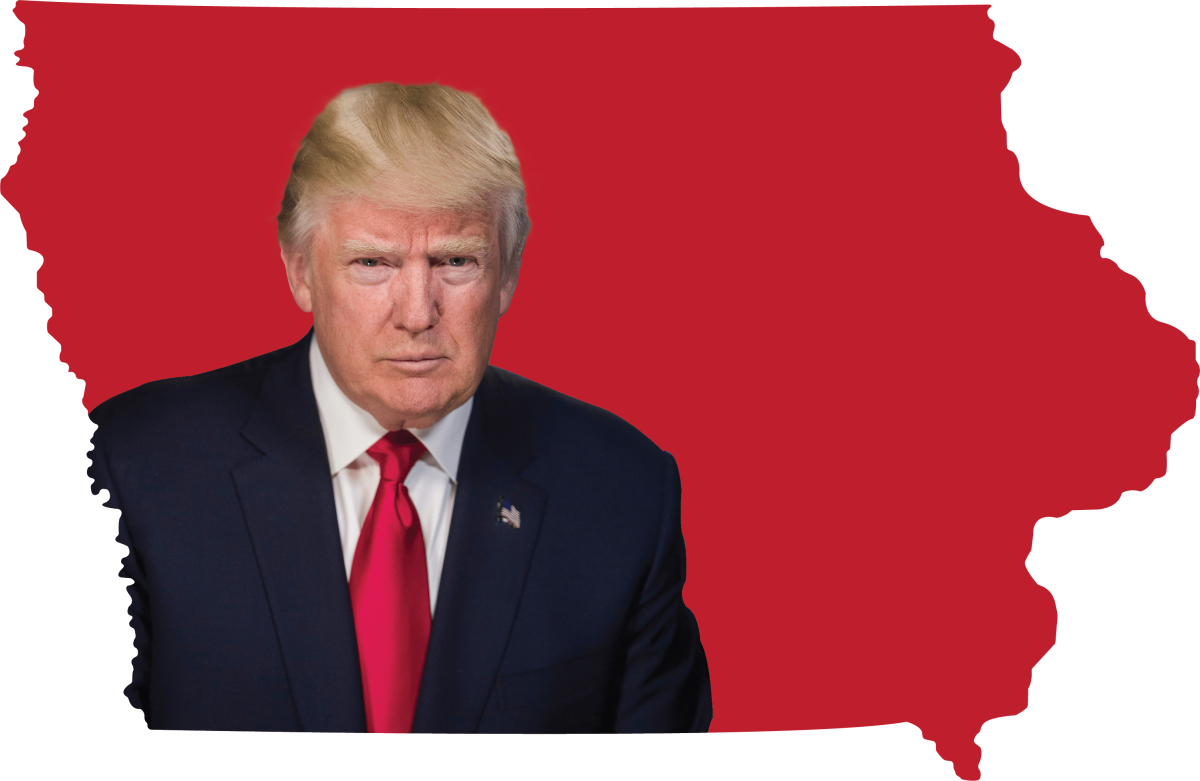This past January, former President Donald Trump won Iowa’s Republican Caucus (in case you hadn’t heard).
Trump’s success in securing the Republican nomination — despite the countless controversies surrounding him and the 91 felony counts currently pending against him — continues to be a stunning phenomenon. Not in the way the Grand Canyon or Margot Robbie is stunning, but more in the way a taser is stunning.
There are several conversations we could have about the way Trump has altered politics: the way he’s convinced his supporters to distrust the media, the way he’s maintained a fiercely loyal fanbase as a 77-year-old alleged criminal and the way he’s managed to stay the popular candidate in a party full of leaders he doesn’t play nice with. The list goes on.
However, I want to focus on his effect closer to home: the way Trump has altered Iowa politics and our precious first-in-the-nation caucus.
While other Republican hopefuls spent most of 2023 getting their high heels dirty in every Pizza Ranch across the state, Trump was mostly MIA. While his cohorts took 99-county tours, received endorsements from popular Iowa Republicans and attended multiple primary debates, Trump showed face in the state a significantly smaller number of times — most often only hosting events restricted to small groups of elite Republicans.
Yet, he won the caucus by an indisputable margin. Low effort, high reward. What does this mean for the future of the Iowa caucus?
Since 1972, Iowa has been the first place a presidential hopeful goes to try their hand at becoming their party’s nominee for president. Though only three of the Iowa caucus winners have ever actually become Commander-in-Chief, Iowa has been a place where no-name political newbies (Jimmy Carter and Barack Obama) could build a reputation for themselves through good old-fashioned grassroots campaigning.
However, Iowa’s former “purple” political status has shifted to a deep red in recent years, and many argue that we lack physical and ideological diversity. That isn’t a bad thing, or something that Iowa should be criticized for — it’s just demographics. However, it does call into question whether Iowa still fits as the nation’s first jury for presidential candidates.
The DNC has already abandoned the Iowa caucuses for that exact reason, moving their first primary to the state of South Carolina in 2024. Iowa used to be a state of people hungry for a diversity of ideas, citizens who were looking for our opinions to be challenged. Now, it appears Iowans tend to close their minds and ears if they’re already set on a particular candidate or political ideology.
After all, Donald Trump won the votes of Iowa caucusgoers despite his complete disregard for our political processes and his nonexistent attempt to engage with Iowans on a personal level.
What does this mean? Politicians don’t need Iowa and its grassroots anymore.
As someone who became enamored with Iowa politics, I was extremely disappointed to watch the only candidate who disregarded that process be the one who swept the caucus votes, relatively unchallenged. This past summer and fall, my internship allowed me to be a part of Iowa’s political process in a very hands-on way. It left me feeling inspired!
I was driving volunteers to campaign events and attending them myself, listening to candidate stump speeches and asking them questions and watching future presidents talk with Iowans one-on-one. I lived in Illinois for the first 18 years of my life, where we just don’t garner the same personalized attention or generate the same hands-on interest in national politics. I’d never before seen candidates in such a direct way before, and it encouraged me to discover there were places in the country where politicians still interacted with voters this way.
Whether it’s in Iowa, South Carolina or some other state in our beautifully diverse country, I just hope Trump hasn’t permanently derailed the demand for politicians to show up to real people and prove themselves as the type of person who deserves to lead the country.







